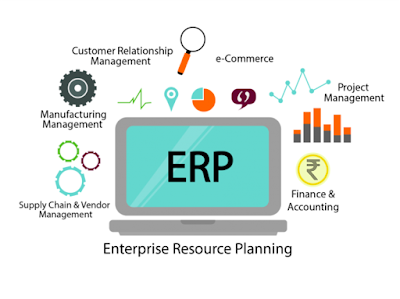Enterprise resource planning (ERP) enables a business to manage all the components of their operation in one place, featuring "modules" that work together to automate processes. An ERP can often be built specifically for the organisation's needs, combining elements such as accounting, CRM, staff management and more. By automating many of these day-to-day back office tasks, businesses can become more efficient, with staff freed up to focus on business innovation and growth. Not only does ERP combine the essential functions of a business into an automated platform, but it can also help businesses concentrate on their core functions such as manufacturing, product planning, marketing and development. There are countless ERP platforms available – some have been developed for specific verticals, while others are more generic, suited to any business type.
 |
| ERP system |
ERP and its Benefits
What makes ERP such a business changer is that everything can be managed from a central console, eliminating the need to jump between different tools to manage everything.
 |
| ERP uses |
This also allows collaboration between departments, permitting staff to access the areas they need to carry out their jobs, with the entire business working towards the same goals with minimal intervention required from the IT department. This central dashboard will also allow stakeholders to get a better overview of the entire business, providing the visibility to make more informed decisions based upon the data across performance, resource distribution and more.
ERP Modules
What makes ERP such an effective tool for businesses is that they can mix and match the modules they need to manage their business, rather than having to buy a huge software ecosystem with features they may never use. It means businesses can cut costs, only using the features they need to make their business tick.
 |
| ERP module |
For example, if parts of your business operation are managed externally, such as finance or HR, you don't need to add on those modules. ERP platforms are extremely flexible for this reason and modules can be easily switched and changed as your business does. For example, if you bring HR in house, you can simply tag on the HR module so your new HR staff can use the same system you're already using. It means that the functionality can be extended, while ensuring everyone in the business has visibility of its operation (at least those who are permitted access to it).
Types of ERP
 |
| ERP Types |
There are a vast array of ERP systems available. Some are more suited to a specific sector, while others are more generic and focus on the operation rather than vertical. If you're unsure which type of ERP system is right for you, we've outlined the benefits of each.
Vertical ERP
Some ERP tools are developed for a specific industry vertical - for example, if you run an engineering firm which has very specific processes and/or equipment, there would be tangible benefits when choosing a system that caters to the need of that sector rather than a generic solution.
Size of business
If you’re a large company, it’s likely your business will operate in a very different way compared to a small enterprise. For starters, you’re likely to have more staff and each person’s role will be limited in comparison to a smaller firm, whose employees are more likely to overlap in their day-to-day duties.
Platform
ERP tools are available to run both on-premise and in the cloud. Carefully consider which is right for your business. Those based in the cloud are generally more scalable because it’s much easier to increase capacity rather compared to on-premise solutions that have limited storage. However, you may require the security of on-premise if your industry is heavily regulated. Cloud-based options also run on a month-by-month or an annual subscription model, avoiding the upfront costs that come with purchasing a system outright. Over the medium to long term however, the cost-benefit analysis may swing towards on-premise ERP systems.
Compliance
Similarly, if your industry sector is highly regulated, you may need to find an ERP tool that specifically ensures you are complying with regulations and will provide the reports you need to present to an industry body, for example. ERP tools offer massive advantages to a business, boosting productivity and innovation, but they can also be a big investment. Whilst off-the-shelf ERP systems are usually suitable for small enterprises, it is important to remember that these less expensive choices may not be the most economical. Investing in a system which does not suit your business demands will not only be a waste of capital, but will affect processes and efficiency.
For more details visit www.voxforem.in
Contact us india.voxforem@gmail.com
Call us on +91 0471 4251 333
No comments:
Post a Comment